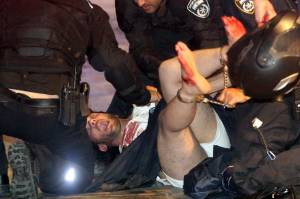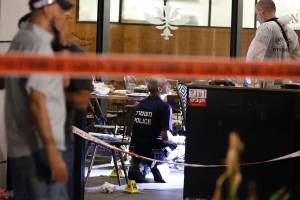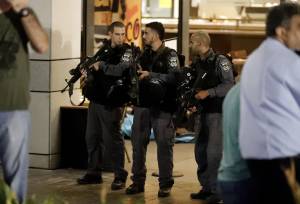The Islamist group Hamas has praised an attack on civilians in Tel Aviv Wednesday night in which four Israelis were killed.
The two shooters, identified as Palestinians, opened fire at the Sarona Market — a popular food and shopping complex near the Israeli Defense Ministry — shattering what was a serene night with chaos and bloodshed.
In total, 13 people suffered gunshot wounds, according to Israel’s national emergency medical service. Four people, including one suspect, are still being treated at hospitals, Israeli police say.

The attackers were dressed as Hasidic Jews, a law enforcement source briefed by Israeli officials said. Police officers shot one of the suspects. The other surrendered, Israeli police spokesman Micky Rosenfeld said.
“People were having coffee,” Amir Ohana, a member of the Israeli Parliament who was at the market, told CNN. “I saw a birthday cake on one of the tables. And then you see the chairs upside down and glass shattered and blood all over.”
Surveillance footage from a cafe near the shooting scene showed chaos as panicked customers knocked over chairs and tables as they rushed to escape. People crawled across the floor and others carried children in their arms.

The aftermath
Two terrorists were captured, with one shot and the second arrested at the upscale Sarona Market, Rosenfeld said.
According to Israel’s security agency, they are both Palestinians from the village of Yatta in the southern West Bank, near the city of Hebron. Both were born in 1995.
Hamas didn’t claim responsibility for the attack, but said it was the “first of many surprises” planned against Israeli forces during the month of Ramadan.
Prime Minister Benjamin Netanyahu called “a savage crime, murder in the heart of Tel Aviv.”
“We will take the necessary steps to attack the attackers and defend those who need to be defended,” he said.
A spokesman for the Israeli military confirmed that military forces were conducting searches in Yatta, where the suspected attackers are from.
The Palestinian Authority, which governs the West Bank, has been participating in “very important ongoing security coordination” with their Israeli counterparts in the wake of the attack, David Siegel, the consul general of Israel to southwestern U.S., told CNN.
The four fatalities were Israeli, Rosenfeld said. At least five other people were wounded in the carnage, said Dr. Gil Fire, deputy director of Ichilov Hospital.
Concerns about security?
Sarona Market is a mixed-use development with a food hall, upscale retail, playgrounds, green space and residences on a central highway. The market, which opened last year, is across the street from Israel’s Defense Ministry and main army headquarters.
The market is considered a “classic soft terror target.”
A press release from the opening of the complex described it as an 8,700-square-meter complex with 91 stalls, shops and restaurants selling food from around the globe.
The Jerusalem Post reported in April that Tel Aviv police wanted to close the market because of “security flaws and safety shortcomings that present a risk to the public’s safety.”
But a spokesman for Gindi Holding, which built the market, told The Post the complex would not be closed and that violations only involved tables and chairs blocking entrances and exits and the way security guards were inspecting visitors at the door.
Violence in Tel Aviv

Tel Aviv is not as violent as Jerusalem, but has not escaped bloodshed.
Two people were killed January 1 when a gunman sprayed bullets from an automatic weapon near a pub in Tel Aviv. Seven people were wounded. In March, an American was killed and 10 other people were wounded in a stabbing along an oceanfront boardwalk. Anti-police riots broke out in May 2015.
U.S. State Department deputy spokesman Mark Toner issued a statement condemning “today’s horrific terrorist attack in Tel Aviv in the strongest possible terms.”
“These cowardly attacks against innocent civilians can never be justified,” he said. “We are in touch with Israeli authorities to express our support and concern.”
Israeli Ambassador to the United Nations Danny Danon called on the Security Council to condemn the attack.
“Today’s heinous attack sadly proves that when the international community refuses to condemn terror against Israelis, the next attack is only a matter of time,” he said in a statement. “Terror in Tel Aviv must be treated the same as terror in Paris or Istanbul.”
Rosenfeld said knife attacks have been more common lately, with the last shooting in Tel Aviv occurring months ago.















